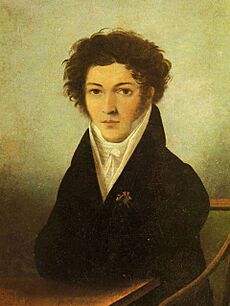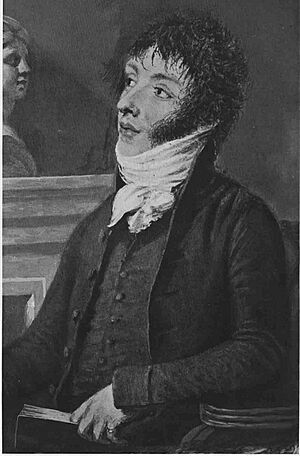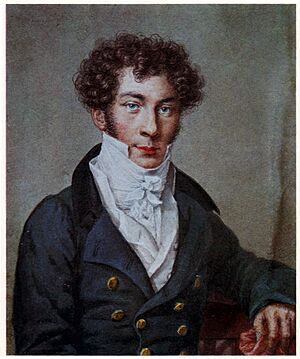Konstantin Batyushkov facts for kids
Quick facts for kids
Konstantin Nikolayevich Batyushkov
|
|
|---|---|

Portrait by unknown artist, 1810s
|
|
| Born | 29 May 1787 Vologda, Russian Empire |
| Died | 19 July 1855 (aged 68) Vologda, Russian Empire |
| Occupation |
|
Konstantin Nikolayevich Batyushkov (Russian: Константи́н Никола́евич Ба́тюшков; May 29, 1787 – July 19, 1855) was an important Russian poet, essayist, and translator. He lived during the Romantic era, a time when feelings and imagination were very important in art. He also worked as a diplomat, serving in Naples for a while.
Contents
Biography
Early Life and Education
Konstantin Batyushkov's early years are not fully known. He likely spent his first four years in Vologda, Russia. After that, he might have lived with his father or his grandfather on their family estate.
His teenage years in St. Petersburg were very important for him to become a poet. He started studying there in 1797 at private boarding schools. These schools were quite expensive and for children from good families. He learned many subjects, including Russian, French, German, history, and drawing. In 1801, he began to study Italian. His first writing was a translation into French of a speech by Metropolitan Platon Levshin.
Beginning as a Poet
Batyushkov is thought to have started his poetry career in 1802. He wrote his first poem when he was fifteen. He felt that this early poem showed his main idea: being unhappy with reality and wanting to explore "distant lands," both real and imaginary.
He started writing poetry seriously around 1804. Two of his early poems were "Bog" (God) and "Mechta" (Dream or Imagination). "Bog" was like the spiritual poems of Gavrila Derzhavin. "Mechta" was a poem he kept working on throughout his life. It showed his belief that "Dreaming is the soul of poets and of verse." This idea connected him to other famous Russian writers like Nikolay Karamzin and Vasily Zhukovsky.
His first published poem was a satire called "Poslanie k stikham moim" (Epistle to My Verses). It appeared in a journal in January 1805.
Military Service and Famous Works
Joining the Army
In 1806, Napoleon's army took over parts of Prussia, Russia's ally. Russia then called for many people to join the army. On January 13, 1807, Batyushkov joined the military. He became a junior officer and went to the West. He fought in the battle of Gutstadt in May 1807 and was seriously wounded at the battle of Heilsberg. For his bravery, he received the Order of St. Anne a year later.

While recovering in Riga, Batyushkov fell in love with a merchant's daughter named Emilie. This experience inspired two of his poems: "Vyzdorovleniie" (Convalescence) and "Vospominaniia 1807 goda" (Recollections of 1807). These poems were very popular and influenced other Russian elegies (sad poems) of that time.
Literary Ideas and Satire
Batyushkov believed that important works of world literature should be translated into Russian. He was influenced by his friend Nikolai Gnedich, who was translating the Iliad. Batyushkov also tried translating parts of Torquato Tasso's "Gerusalemme liberata".
In July 1809, he wrote his famous satirical poem "Videnie na bregakh Lety" (A Vision on the Shores of the Lethe). This poem quickly became well-known. It described a dream where all Russian poets had died and their works were being tested in the waters of the Lethe (a mythical river of forgetfulness). Works that were not good enough would sink. The poem made fun of many writers and helped Batyushkov become known as a mature and original poet.
War and Its Impact
The 1812 Invasion
In April 1812, Batyushkov started working at the Imperial Public Library. He enjoyed a quiet life there, but this peace did not last long. Napoleon invaded Russia on June 12, 1812. Batyushkov wanted to join the army right away but was too sick.
The destruction he saw deeply affected him. He called the French "Barbarians! Vandals!" and was angry that they spoke of freedom while causing such damage. In March 1814, Batyushkov joined the military again as a junior captain. The events of 1812 influenced his poem "K Dashkovu" (To Dashkov), where he wrote about seeing Moscow in ruins. He saw the war as a great evil.
Travels and Return Home
In January 1814, Russian troops entered France and moved toward Paris. Batyushkov found his first month in Paris exciting. However, he soon felt that French literature was no longer as great as it used to be. He became ill and depressed in May and decided to return home. He spent two weeks in England before sailing back to Russia. He later wrote about his journey in a travel sketch.
Later Years and Illness
New Beginnings and Recognition
In early 1815, Batyushkov faced personal difficulties and a serious illness. He sought spiritual healing and seemed to have a religious experience, which can be seen in his poem "Nadezhda" (Hope). He also wrote "Posledniaia vesna" (The Last Spring), a poem about love and illness.
Around this time, in 1815, Batyushkov met the young poet Aleksandr Pushkin. This meeting became very important in Russian literary history.
In October 1817, Batyushkov published a collection of his poems called "Opyty" (Experiments). It included elegies, letters, and other works. The book was well-received, and Batyushkov quickly gained public recognition. He became an honorary member of several societies and an honorary librarian.
Mental Health Struggles and Death
During 1820, Batyushkov's depression worsened. He started having arguments over small things. He became very upset when an editor published one of his poems without permission, saying he would stop writing forever. His mental health continued to decline.
In 1822, he traveled to the Caucasus and then to Simferopol, where he started showing signs of paranoia. He even burned his books. In 1823, he was sent to St. Petersburg under a doctor's care. His family and friends looked after him for a year. In 1824, he wrote a letter to the Emperor asking to enter a monastery. Emperor Alexander I decided to send him for treatment at the state's expense.
From 1824 to 1828, Batyushkov was treated in Germany. Then he lived in Moscow until 1833, and after that, he lived in Vologda. In 1833, he was officially released from service and given a pension for life because his illness was incurable.
When he was ill, he wrote very little. His last poem was a short verse written in 1853, which ended with: "I only wake to fall asleep / And sleep, to awake without end."
Konstantin Batyushkov died on July 19, 1855, from typhus. He was buried in the Priluki Monastery near Vologda.
See also
 In Spanish: Konstantín Bátiushkov para niños
In Spanish: Konstantín Bátiushkov para niños
 | Leon Lynch |
 | Milton P. Webster |
 | Ferdinand Smith |


